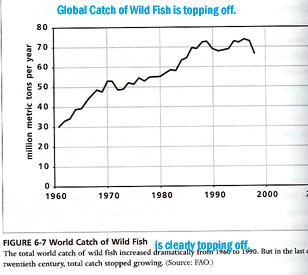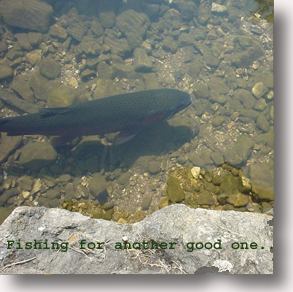TLUXE raises & catches fish -and so my attention.
A broader understanding of the macro issues regarding Fish Farming.
Homo sapiens has lived on this planet Earth for some 100,000 years. Humans have cultivated land, organized and lived in cities for about 10,000 years. In Thailand human bones have been found discovered to be dating back some 5000 years.
Humans have experienced rapid exponential growth in capital and demands from this planet for about 300 years. Just one consequence of this, is the increasingly topping off on wild fish catch, in the open oceans. As shown in the graph below. Limits on this are finally obvious and are now a dominant aspect of world fisheries. Clearly the global catch of wild fish has stopped growing and may probably be declining.
There is no way of knowing until many more years have passed whether this plateau is sustainable, or is the beginning of a collapse.
No surprisingly, fish farming has grown rapidly during the last years. Currently producing nearly 40 mill. tons per year, up from only 13 in year 1990. One third of the fish consumed in the world is now farmed!
This is at first sight a tremendous achievement and may illustrate the ability of technology and markets to solve a problem caused by the demanding "human footprint". As often in life, as when analyzing stocks, first sight is not the clear picture.
Consider these below listed not negligible side consequences, as spelled out in a recent book called "Limits to Growth, the 30 year update" By Dennis & Donella Meadows and Jorgen Randers and Published by Earthscan, 2004.
"Fish production used to be a food source; its is becoming a food sink. Fish and other aquatic species used to feed the poor; they go now increasingly to the rich. Fish schools are the neutral part of the environment; fish farms are environmentally devastating".
"Fish farming is not a net food source; it merely converts one form of food to another, with inevitably losses at each stage. Typically cultivated fish are fed with grain or meal prepared from fish….(further) the farming of fish, shrimp and other aquatic species causes great environmental damage"
Hence, with this macro view at hand, it seems TLUXE may not the long term "wonderkind" one might first conclude? Since TLUXE farms fish and shrimps for exports, we so today know what the key long term & concerns issues are.

Thailand is a dominant & leading world food producer and surely has many proven skills (and has won awards) in the proper management besides sustainabilty of such endeavors. As one example, just recently it has done overall a formidable (and globally praised) job in containing the chicken/bird flu outbreak. And while shrimp farming often gets a bad reviews due to polluting water, here too Thailand has done an overall better job. Many poor in some Thai villages, saw a bonanza when raised & baby shrimp escaped into the water run off chanels, only to grow and be abundant to all, as long as they keep shrimp farming there.
When I hope to visit TLUXE in the near future I will know what to ask & look for, regarding the long term sustainability and success of its endeavor.
In the meantime TLUXE (2.50) seems to be on a solid earnings rebound, has a history of paying out high cash dividends and commands a very low p/e and price to book ratio. It so deserves being a key featured stock of mine at current price levels.
Best Regards,
Paul A. Renaud.
www.thaistocks.com

